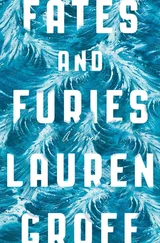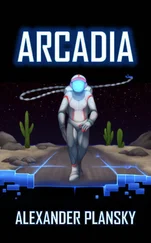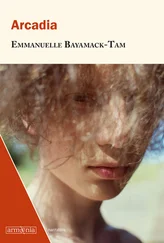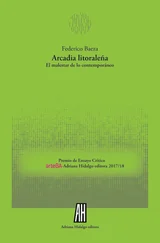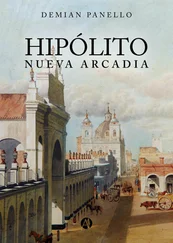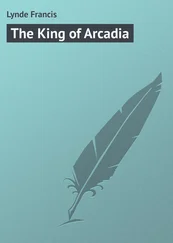Lauren Groff - Arcadia
Здесь есть возможность читать онлайн «Lauren Groff - Arcadia» весь текст электронной книги совершенно бесплатно (целиком полную версию без сокращений). В некоторых случаях можно слушать аудио, скачать через торрент в формате fb2 и присутствует краткое содержание. Год выпуска: 2012, Издательство: Hachette Books, Жанр: Современная проза, на английском языке. Описание произведения, (предисловие) а так же отзывы посетителей доступны на портале библиотеки ЛибКат.
- Название:Arcadia
- Автор:
- Издательство:Hachette Books
- Жанр:
- Год:2012
- ISBN:нет данных
- Рейтинг книги:3 / 5. Голосов: 1
-
Избранное:Добавить в избранное
- Отзывы:
-
Ваша оценка:
- 60
- 1
- 2
- 3
- 4
- 5
Arcadia: краткое содержание, описание и аннотация
Предлагаем к чтению аннотацию, описание, краткое содержание или предисловие (зависит от того, что написал сам автор книги «Arcadia»). Если вы не нашли необходимую информацию о книге — напишите в комментариях, мы постараемся отыскать её.
Arcadia — читать онлайн бесплатно полную книгу (весь текст) целиком
Ниже представлен текст книги, разбитый по страницам. Система сохранения места последней прочитанной страницы, позволяет с удобством читать онлайн бесплатно книгу «Arcadia», без необходимости каждый раз заново искать на чём Вы остановились. Поставьте закладку, и сможете в любой момент перейти на страницу, на которой закончили чтение.
Интервал:
Закладка:
Bit thinks: We are a hive. Get up when we hear other people waking up. Do yoga in the Proscenium together. Warrior pose, corpse pose. Good food smells from the Eatery, breakfast, lunch, dinner. Cookies all day long. No more cold loo on my thighs, warm toilet. No more spiders and wind in the Bread Truck. Now radiators that hunch under the window and clink and hiss on cold nights like wheezing monsters. Now when parents come home in the evening from their work units, they have time to talk. Hannah in a book club, White Niggers of America, her voice flaming bright in the Library; Abe in a political theory group, ten beards leaning into the circle, the soft cheeks of the ladies in the shadows. They build societies of air, then carefully tear them down. The adults have grown softer. They squeeze each other’s arms when they pass, give happy hugs. In the Dormitory, the children lie next to one another for naptime. The warm pile of children, the smell of crayons and clay and paste. Handy’s voice booming and joyous everywhere.
Bit thinks: Oh, we love each other better now.
He sleeps one week in the Dormitory, on the squeaking cots, far from the bodies of the others. Leif snores. Jincy sleepwalks. The Dormitory is so vast the shadows thicken and move in the corners. He wakes three times per night, desolate for his mother. At last, he writes a note to Sweetie. He labors over it with a red pencil.
Im to little, it says. I have to sleep with Abe and Hannah.
When he hands it to Sweetie, she goes speechless. You can read? she says.
Sweetie gives the note to Hannah, whose lips form an O.
Oh, Bit, you can write? she says. She kneels to his height and kisses him.
He moves into their tiny room on the second floor of the Main House, and sleeps on the old pallet on the ground beside their small iron bed.
As he sleeps, a fast wind descends on the world and rain slants horizontal. He wakes to the forest thrashing outside in a strange green glow.
There is lightning, a blue snap, and the world goes jagged. In the flash he sees Hannah midmotion, hair spun over her mouth, sheet peeled to her waist. One breast is in the open. A hairy arm buckles her shoulders.
In the swallow of black after the flash, he understands what was in the shadow above her crown: Abe’s face, eyes closed, mouth a deeper darkness in the dark of his beard, straining toward something, it seems, he can just about grasp.
Bit crouches under the cherry tree on the lawn. Wet petals fall on his head and the sun is gentle. The adults are in the fields, planting, save Abe, who must fix the place on the roof where the oak branch fell during the storm. Bit can see the pale blue sweater of his father as he works, reflected upside down in a puddle. From here, his father’s head points into the center of the earth.
When Bit closes his eyes, he can see what Abe can see, how Arcadia spreads below him: the garden where the other children push corn and bean seeds into the rows, the Pond. The fresh-plowed corduroy fields, workers like burdocks stuck to them. Amos the Amish’s red barn, tiny in the distance. The roll of the forest tucked up under the hills. And whatever is beyond: cities of glass, of steel.
There would be a strong wind up where his father is. It would be hot, because it’s closer to the sun.
Bit sees the pink petals skim the surface of the water, passing like ghosts through his father’s body. It is wonderful, absurd. He laughs with sudden lightness, and the sound emerges whole from his mouth before he can clamp it in, a needling sound like an old hinge. He presses his hands to his mouth, and his skin tastes like grass, like dirt.
For a moment after Bit’s sound, there is nothing. The wind ruffles the water. A bird passes overhead, a brief cold shadow over the sun.
But now, reflected in the puddle, Abe. Rolling off the roof; a marble, a pebble. For one bright moment, Bit’s father hangs in the air. He is stuck, hovering; some string must be holding him. But there isn’t a string. Abe flies down the surface of the puddle.
Bit lifts his eyes from the water and into the world. He blinks. Things are dim, like looking into the night from a lit room. On the courtyard grass Bit sees a tiny blue crumple. Somewhere, an engine roars to life and a crow hisses from a branch above and Bit’s foot breaks the puddle and he begins to run.
Heliopolis
So lovely, the goosefleshed girls in suits gone flabby, the girls with lips rimmed in blue. Queen of all is Helle. She has been away with Astrid since winter began, returning a week ago to dazzle. She sits, bone white, on the boulder by the edge of the Pond. She is dreadlocked, nose-studded, her elbows puckered with cold. She is so pale Bit can hardly look at her.
The Pond roars with voices; it hurts Bit’s ears. An early day in May, and freezing, but the kidlets and Ados of Arcadia have come here to soak up the chill sun. What had once seemed to Bit an impossible stretch of water has shrunk with two hundred thrashing bodies in it. He swims to the center of the Pond and goes under. The boys whiten the surface; the girls’ feet dangle off the boulders, small, skimming things. He goes deeper, to the bottom, where the young weeds are nubbins under his feet and the cold clutches at him.
There is peace in this deep. He is free from the layered tensions of Arcadia, the overcrowding, the hunger. But up where the surface meets the sky, a speck becomes an open hand, becomes a star slowly falling toward him. A pulse in his gut when he sees that it is Helle, her eyes open to search for him. Her feet, landing, send shivers of mud to his knees. She reaches toward Bit, touches his side. Bad Helle, she tickles him.
He has to race the silvery swim of his lost air to the surface. There, he gasps and chokes, tears starting to his eyes. Helle comes up, laughing. Her dreadlocks float around her head, weeds themselves.
You’re avoiding me, Bit, she says, her mouth half underwater.
No, he says but can’t look her full in the face. He isn’t avoiding her; he just can’t see the old Helle under the new gloss and glamour of the Outside in her.
She says, no longer laughing, Look at me. It’s just me, Bit.
The other girls are swimming toward them, their heads like a flock of pale ducks over the water. Before they reach Helle, he does look at her. For this one moment, he sees the old Helle, that vulnerable girl more lost, more watchful than even he had been.
At last, the kidlets have turned blue and fled, and only the toughest remain, twelve adolescents — Ados — every one of them Old Arcadia. His best friends shiver in the drizzle next to Bit. Ike, lanky and shining with the same white light as his sister; Cole and Dyllie, with Sweetie’s beautiful face, in shades of pink and brown. They sit together, feigning ease, listening to Helle, who was never known for grand storytelling, fill them in about the Outside: Everyone’s fat and smells like chemicals. They wear stupid buttons all over their jackets and all they talk about is the World’s Fair.
All at once, it seems, his friends are straining to listen. Then he hears, too, and knows that he has been hearing the beat for some time, under the birds, under the wind, under the leaves moving in the trees. Helicopters. Bursting over the treetops, glossy black and taloned, flying low. Bit can see the pilots in earmuffs and the grim men in the doors holding machine guns.
The wind from the blades tosses water in their eyes, sends rocks against their skin. The choppers pass, and the Pond sloshes against the shore. Bit leaps up and races his friends toward Arcadia House, easily outstripping the rest over the mud paths worn into the lawn, though Cole, too, is fast. People clump in the doorways of the Soy Dairy, the Bakery, the Eatery; heads mushroom from the windows and shyly withdraw. A herd of Trippies scatters, leaving their Minders behind. People pour around the Terraces, massing in the circular drive, and Bit hurtles through the sunburnt bodies, pitchforks and shovels, mudded feet and bodily stink and screaming kidlets, the babies wailing from their slings, practically the whole crowded nine hundred Arcadians having left their scattered pursuits to gather here. Bit scans, panicking, for Hannah. When he finds her — hair in twinned crowns around her head, plumper now because of the pills, frowning up at the sky — he is washed with relief. Her apron is smeared with soy; he takes her hand and puts himself between her and the machines. But she is shouting Abe in his ear, and here it is again, the sharp stone in Bit, his guilt; Abe always an afterthought. Bit scans until he sees his father in his wheelchair, on the Arcadia House porch. The thin pale legs in the shorts, the streaky beard. Abe is trapped up on the rain-slick hill. Without Hannah, he would have stayed there. Bit sprints up the Terraces. His father pats his shoulder, says, Good boy, steer me down.
Читать дальшеИнтервал:
Закладка:
Похожие книги на «Arcadia»
Представляем Вашему вниманию похожие книги на «Arcadia» списком для выбора. Мы отобрали схожую по названию и смыслу литературу в надежде предоставить читателям больше вариантов отыскать новые, интересные, ещё непрочитанные произведения.
Обсуждение, отзывы о книге «Arcadia» и просто собственные мнения читателей. Оставьте ваши комментарии, напишите, что Вы думаете о произведении, его смысле или главных героях. Укажите что конкретно понравилось, а что нет, и почему Вы так считаете.
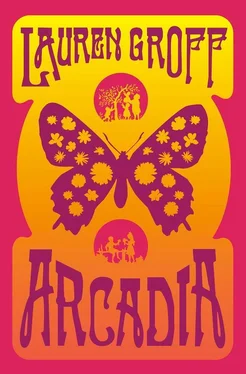
![Andrea Höst - In Arcadia [Touchstone - Extras]](/books/56405/andrea-host-in-arcadia-touchstone-extras-thumb.webp)

